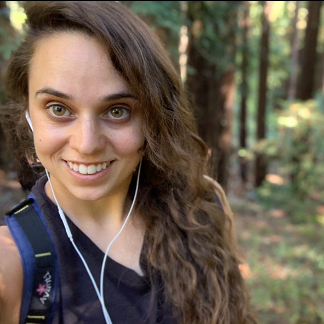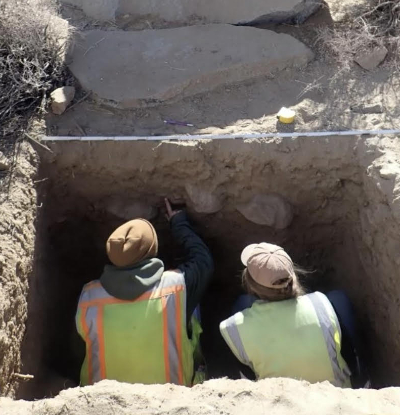Anthropology Alumni Share Their Experiences
Our peer advisor, Sam Bass, connected with some Anthropology alumni to share their experiences as a UCSC student and the work they have been doing post-graduation. Read more about how they are using their degree and skills in their careers below.
Alec Apodaca
My name is Alec Apodaca and I am currently a PhD Candidate at UC Berkeley, but I received my bachelor’s degree from UC Santa Cruz in 2017. My unique blend of experiences gathered through the labs and fieldwork at UCSC, specifically through Professor Schneider's lab, put me in a position to be a top candidate for jobs and for grad school. In his lab, I carried out research on Indigenous clam bed management practices during the colonial period in California. Collaborating with indigenous California tribes, learning GIS applications in archaeology, and having the space and guidance to carry out a senior thesis have all been formative in building my career. Today, I continue this research on indigenous natural resource stewardship in an expanded way, but my ideas, methods, and theory were initiated at UCSC working closely with my undergraduate advisors. UCSC has a strong network of environmental and historical anthropological research, so I feel like I really lucked out.
Taylor Harrison
 While studying anthropology, I learned much about diverse people, cultures, and perspectives and have carried this with me postgrad. I majored in anthropology because it’s a personal passion and a profession I may want to enter in the future. Once graduated, this ongoing and ever-growing knowledge of people has helped foster job opportunities and my professional development. I have gained and refined many transferable skills through UCSC’s anthropology program—specifically, I have been prepared for many people-facing roles such as HR and customer and technical support.
While studying anthropology, I learned much about diverse people, cultures, and perspectives and have carried this with me postgrad. I majored in anthropology because it’s a personal passion and a profession I may want to enter in the future. Once graduated, this ongoing and ever-growing knowledge of people has helped foster job opportunities and my professional development. I have gained and refined many transferable skills through UCSC’s anthropology program—specifically, I have been prepared for many people-facing roles such as HR and customer and technical support.
While I entered the workforce before pursuing a graduate program, anthropology has definitely enriched my life beyond my time at UCSC. For current and future anthropology majors, I encourage you to follow your passions and confidently know that social sciences are foundational in the workforce and in daily life. If you are considering going to grad school, it’s also ok to take a break to find a plan that works for you. Last but not least, connect with your peers and professors and community to discuss your future as an anthropology major!
Alexandra Tutwiler
I graduated in 2020 with a combined degree in Earth Sciences and Anthropology, so I was able to gain a lot of coursework experience in both archaeology and geology that has proven to be incredibly useful in my postgraduate career. I started my master’s in Human Osteology and Funerary Archaeology at the University of Sheffield in October of 2020, and I was fortunate enough to complete that program in under a year! My dissertation focused on employing carbon and nitrogen stable isotope analysis to reconstruct the diets of 16 individuals from a 14th century ecclesiastical community in rural Lincolnshire, and I am currently in the process of preparing my research for publication. I will be starting my PhD with the Human Osteoarchaeology lab at Leiden University in The Netherlands this fall, but I am supervising a zooarchaeology lab back at UCSC in the meantime! I have been incredibly fortunate to have had the opportunity to remain in academia, and I credit all of my success thus far to the incredible anthropology faculty at UCSC—without them, I definitely wouldn’t be where I am today!
Archaeology is a highly interdisciplinary field of study that draws from a myriad of subjects such as history, chemistry, biology, and geology—making it, I believe, one of the most versatile and unique degree programs offered by the university. The way in which the faculty at UCSC approaches this incredibly diverse field of study highlights the many facets of archaeology as a whole while also presenting students with the opportunity to customize their coursework to best suit their interests. The opportunities that this department presented me with helped prepare me for a career in higher education, and I will forever draw upon the skills that I gained during my time in Santa Cruz.
Amanda Hill
 In 2013 I was a transfer student to UCSC and initially I wasn’t sure what I wanted to do or even could do with a degree in anthropology. I wasn’t even considering archaeology because I thought only old rich white men were archaeologists. However, as I took more classes and made connections with the professors and graduate students while doing lab internships, I realized that archaeology wasn’t just an academic pursuit for old men in tweed jackets. During one of the lunch talks offered by the Anthro department I learned about the Cabrillo College field school run by Dustin McKenzie. This was the only field school I even considered attending because it was honestly the only one I could afford, but also because Dusty made working in archaeology sound not only feasible but also incredibly fun.
In 2013 I was a transfer student to UCSC and initially I wasn’t sure what I wanted to do or even could do with a degree in anthropology. I wasn’t even considering archaeology because I thought only old rich white men were archaeologists. However, as I took more classes and made connections with the professors and graduate students while doing lab internships, I realized that archaeology wasn’t just an academic pursuit for old men in tweed jackets. During one of the lunch talks offered by the Anthro department I learned about the Cabrillo College field school run by Dustin McKenzie. This was the only field school I even considered attending because it was honestly the only one I could afford, but also because Dusty made working in archaeology sound not only feasible but also incredibly fun.
I’m so glad I was able to attend that field school because I not only was able to learn the basic skills I needed to work in Cultural Resource Management (CRM) but I was also able to make connections with archaeologists from a local CRM firm who were volunteering there. Through the connections I made at this field school I was able to get my first job as an archaeological field technician. The critical thinking and practical skills I learned from the classes and lab work at UCSC have been crucial to me as I have continued my career in archaeology. I have now been working in the field for eight years and am currently a full-time staff archaeologist for Albion Environmental. The lab-based skills I gained while attending UCSC have helped me in my roles as a lab director and faunal analyst, but the critical thinking and practical knowledge I gained from cultural and archaeology classes have been invaluable to me as I work in the field, navigating how to work with construction companies, developing relationships with descendant communities, and engaging with the public.
